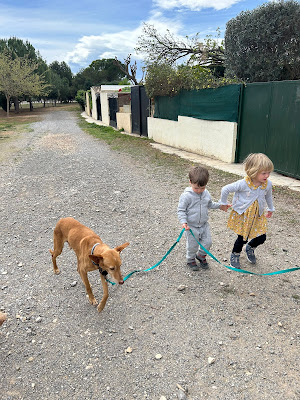With the grandkids due to visit us again at the weekend, my mind naturally wanders back to Easter, when they were with us last.
Easter! School was out, giving the grandkids a perfect opportunity to visit us in Valencia where, as they run no risk of forgetting, ice cream gets served daily. And to have all the fun that Easter itself provides.
Part of the fun of an Easter visit...
Escher painted hands. So why shouldn’t Elliott paint his?
Easter, as we all know, is the feast of chocolate, with some egginess, bunniness and lambiness thrown in. Just like Halloween has nothing to do with the eve of All Saints Day, but everything to do with pumpkins along with whimsical and only slightly sinister costumes. Or Christmas has nothing to do with the arrival on earth of the prince of peace and redeemer of mankind and everything to do with a large jovial fellow in a big white beard and a red suit, travelling by flying sleigh drawn by reindeers and bringing – the best bit! – gifts, gifts, gifts.
There are those, the more purist among us, who haven’t quite got the Easter message. They think it’s to do with the death and resurrection of the son of God, gaining the redemption of mankind by his own sacrifice. Well, this is a slightly odd view, as the French philosopher Diderot pointed out, since God ordained the suffering of mankind (you know, after that nasty business with the apple in the Garden of Eden) and Christ is himself God, so what we’re being asked to believe is that God sent himself to earth to suffer and die to save mankind from the punishment he had himself decreed for it.
Anyway, to settle all doubts in the matter, I’m glad to say that I have here the very passage from scripture that justifies the much more widespread interpretation of Easter. I confess that it doesn’t figure in any of the four gospels and, indeed, it’s a little obscure where exactly in holy writing it appears, but please read it and I’m sure you’ll agree with me in attributing the appropriate authority to it:
And thus spake he, ‘go forth and discover one of the bunny kind, and let him travel wide and far among the woods, and there find secret places where chocolate may be left so that only they who are diligent will find it, and that chocolate shall have forms various and diverse, as of eggs, but also of creatures of the woodland or the farm, as perhaps other bunnies or hens or lambs, and with them shall be concealed also forms of creatures long gone that are of the kind known as dinosaurs, but these shall be made of plastic’.
Well, we took the grandkids into the woods and, lo and behold, hidden in the trees, they found various chocolate items, in the form mostly of eggs but also of bunnies or hens and, wonder of wonders, in an eery coincidence given the scripture I’ve just quoted, dinosaur toys made of plastic. I will admit that they had a little guidance in their quest. When my son, their father Nicky, and I showed up with them, Sheena their mother and Danielle their grandmother were already there and they provided helpful hints to direct the kids’ attention to the places most likely to contain anything worth finding.
 |
| Look what we’ve found... |
The kids had a great time and, thanks to some strict rationing applied by Danielle and Sheena, sickness was avoided.
I’m glad to say that dinosaurs were not the only members of the animal kingdom that Matilda and Elliott met while they were with us. Nor were all those creatures made of plastic. They had a fine session with living animals of the equine kind (sitting on them) and one of the canine persuasion (to be handled with care).
The horses (well, ponies) provided them with what was in fact their second outing as riders. We’re now looking at where to sign them up for something a little more sustained in the way of training when they’re with us for a slightly longer time and can take advantage of it. But in the meantime, even if all they were doing was having a bit of a wander around on ponies being led by a kind and pleasant pair of instructors, they enjoyed themselves enormously.
 |
| Even better than plastic dinosaurs |
During such an existence, the dogs don’t get much exposure to kids. So when poor old Max met these two little bundles of speed and – how shall I put this? – un-quietness is perhaps the most tactful term, he had no idea what to make of them. He decided, as most animals do faced with something unfamiliar, that they might well be a threat. So he growled and even made a less than friendly move towards them. That’s not to say that he did anything that caused any harm, just that he suggested he might.
So there’s some training to be done. Though I don’t want to leave you the impression that the first encounter was all bad. There was joy too, especially over walking him, which Matilda and Elliott did together.
 |
| Walking the new dog |
































